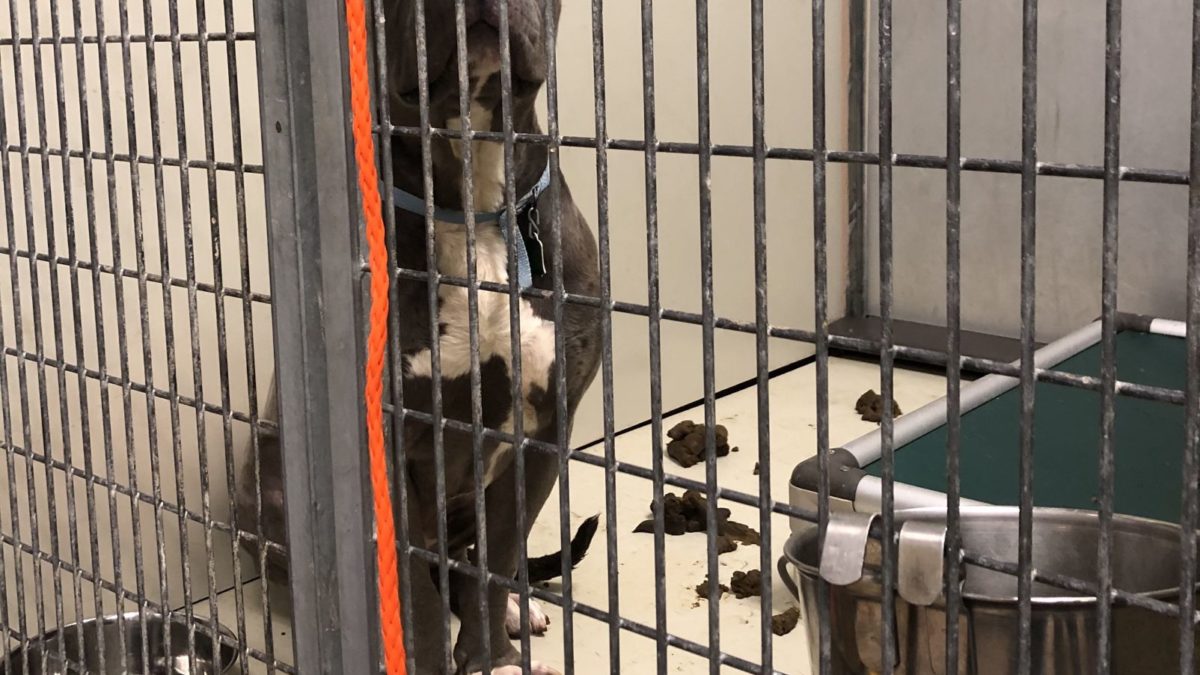When you walk into ACCT Philly, the region’s largest animal care and control service provider that contractually serves the city of Philadelphia, you notice a huddle of people looking to surrender their unwanted animals or to drop off found strays, as well as large bins for donations of food and linen.
The donations are appreciated, but volunteers say they are mindful of the linen as it’s often infested with bedbugs.
Then you enter the dog kennels and are accosted by a cacophony of barking canines, ranging from 90 to 100 at a time in this oversaturated, under-sanitized warehouse of woe.
On a recent afternoon, many of these dogs had already soiled their cages, contributing to the overpowering stench of dog feces and urine. Standing water pooled and spilled due to the lack of a competent drainage system. Enormous fans staged throughout the space, without windows or daylight, circulated the fetid air.
The barking was unbearable.
Trying to focus on a potential dog to adopt required the utmost zen focus. Many of the canines at the facility are pit bull mixes, many of whom wallowed in their own waste in cages on this recent afternoon. Rodents scurried about in the gutters of cages, while a bin of used mop heads stood near a wall. One dog had to tread gingerly around puddles of standing water, which were likely comprised mostly of urine.
Cats meowed from their cages in desperate attempts to catch the attention of visitors or nestled into paper sacks for comfort and protection. Despite the best efforts of volunteers and staffers, the whole place smelled like a giant litter box that hadn’t been emptied in a month.
It’s a stench that is almost unbearable in the morning, a worker said.
These are the current conditions volunteers will be protesting in front of City Hall on Aug. 21 to demand more funding and, ideally, a new building. Currently, ACCT Philly, which handles nearly 18,000 animals annually for the city, is housed in a retrofitted warehouse on Hunting Park Avenue, overrun, according to volunteers, with mice. It’s ironically shared with Vector Control, dedicated to the ridding of household pests.
Longtime ACCT Philly volunteer Andrea Sunderland emphasized that Wednesday’s protest has nothing to do with the staff at ACCT Philly, who she and other volunteers said work very hard to take care of the animals, but has everything to do with a lack of funding from the city.
“I just can’t stress it enough,” Sunderland said. “It’s just so inadequate. It’s not fit to house animals. It never was. It was a warehouse.”
Lack of a leader in the pack
To make matters worse, ACCT Philly just lost its second executive director in less than two years. Its most recent executive director, Susan Russell, is resigning after less than a year in her position and did not respond to requests for comment.
ACCT’s previous executive director, Vince Medley, who resigned in the spring of 2018, came under fire from City Controller Rebecca Rhynhart’s office for waste and mismanagement of funds.
“The staff and volunteers of the shelter do what they can with the little resources they have, but it cannot continue to stay this way,” ACCT Philly volunteer Brenda Johnson wrote PW in a detailed email. “The City of Philadelphia, City Council, Managing Director’s Office, and Mayor need to reallocate their funds and get their priorities straight and work with us to care for the pets of the City of Philadelphia.”
Johnson also criticized the city for failing to allocate funds to spay and neuter animals coming into its shelter. “We cannot have a program to do this because [we have] no funding, no space to dedicate to this [and] Not enough staff to run it – all of which could be done if we had the funding we need as [essentially the city’s] animal control,” Johnson wrote PW. “If the city doesn’t start enacting stronger spay/neuter policies, the animals will never stop coming in, and without the funding to start a spay/neuter initiative, they will go right back into society unaltered to breed more. How can we do this? Funding. Altered pets are less likely to bite, less likely to roam, less likely to have severe medical needs.”
Clearly, the volunteers are willing to raise awareness of the deplorable conditions they and the animals they serve must contend with.
It was suggested to PW that we should talk to the board about the “improvements” that were being made behind the scenes. Since the impetus of this story, PW has made repeated attempts to contact members of ACCT’s board, which includes former Philadelphia mayor and Pennsylvania Gov. Ed Rendell and City Councilman Allan Domb.
Rendell did not respond to requests for comment. Domb’s office re-routed PW to speak with Joanna Otero-Cruz, an ACCT board member to speak on its behalf.
Four days before the release of the story on Aug. 20, Otero-Cruz responded, claiming no one from Philadelphia Weekly reached out for comment and then offered the contact for the communications lead to get the process started moving forward.
However, attempts to reach Otero-Cruz for comment, who is also the deputy managing director of community relations for the City of Philadelphia went unreturned even after her initial email.
This follow-up to Otero-Cruz was sent less than 24 hours later, and again went unreturned.
In the meantime, conditions inside the ACCT Philly warehouse remain unbearable, with no insight from leadership on what is being done in the fight for funding or to fix the state of the facility for the animals volunteers have committed to serve.
Health hazard haven
“There are mice everywhere,” Andrea Sunderland said. “Anything low to the ground, if you didn’t use it within a couple of days, there might be mouse droppings in it. The dogs are going to the bathroom in their kennels. The volunteers try to get them out, and we try to clean the kennels.”
Imagine all of that combined with a lack of ventilation and faulty drainage within the building, according to volunteers.
In May, an outbreak of a deadly upper respiratory infection in dogs lead to a shutdown of the facility for several weeks. The PSPCA had to step in to help because of ACCT Philly’s lack of resources and space to separate out the sick animals from the well.
In a June 6 open letter to Mayor Jim Kenney and city Managing Director Brian Abernathy, volunteers who’d had enough wrote, “We believe one of the most important factors in the spread of disease here is the lack of proper/working plumbing and drainage system leading to standing water throughout the kennel area (which harbors bacteria) as well as feces, vomit, urine and other bodily excrement left to puddle on the floor, being walked through by animals and humans, carrying disease and parasites from one place to the next. When kennels are cleaned, the drains back up so the spray from the hoses on one side of the guillotine forces everything in the drain into the kennel behind it.”
The letter, graphic in its description of the facility, ended with a statement that dug deep: “In a city that is progressing at increasing speeds, the animal welfare of this city is declining.”
TWITTER: @PHILLYWEEKLY






